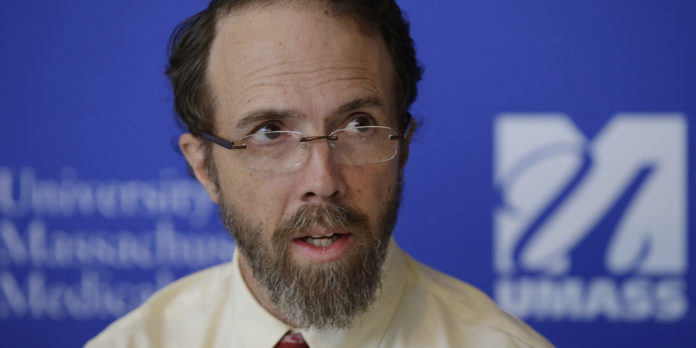
American Ebola survivor Dr. Rick Sacra, pictured above, announced today that he will return to work at the missionary hospital in Liberia where he contracted the virus last fall.
An American doctor who survived Ebola earlier this year plans to return to Liberia — the country where he contracted the deadly virus — later this week to help once again.
Dr. Rick Sacra, a Massachusetts-based family physician who contracted the Ebola virus while treating patients in Liberia last fall, announced today that he will fly to West Africa on Thursday to volunteer at a hospital run by the SIM missionary organization.
The 52-year-old physician said he planned to be in Liberia for about one month. He will not be working in an Ebola ward, but will focus on caring for patients with malaria and other chronic health issues such as high blood pressure and diabetes. He will also provide pediatric and maternal care, including delivering babies.
These services are greatly needed in Liberia, as the Ebola crisis continues to overwhelm the country’s limited health care system, causing the needs of patients with other ailments to become less of priority. According to the latest figures from the World Health Organization, more than 800 healthcare workers have been infected with Ebola and nearly 500 have died from it since the outbreak was confirmed last March.
Ebola survivors, who have immunity to the virus, have been playing important roles in West Africa caring for the sick and orphans of the disease, as well as doing public health education. While Dr. Sacra won’t be treating Ebola patients, his immunity may allow him to take on some special jobs.
“I may be the go-to guy for unknown, risky-looking patients,” he said at a news conference Monday. Many doctors working in the region believe health care workers have been infected by patients that were not immediately diagnosed with Ebola. Dr. Sacra’s colleague, Dr. Kent Brantly, believes he may have been infected that way, and Dr. Sacra himself was not directly treating known Ebola patients when he became infected.
Dr. Sacra, who has spent years working as a missionary in Liberia, volunteered to return in August with the humanitarian group SIM international to help restore services at ELWA hospital after Dr. Brantly and fellow missionary Nancy Writebol contracted Ebola along with three Liberian staffers at the facility.
He was transported to Nebraska Medical Center at the end of September after he tested positive for Ebola. He was successfully treated at the hospital and recovered from the virus, but later endured a few subsequent health issues that may have been linked to his illness, including vision problems and another bout in the hospital to receive treatment for a respiratory infection. He also needed physical therapy to regain his strength.
But Dr. Sacra said he never doubted he’d be going back to help fight the epidemic that’s infected more than 21,000 people and killed nearly 8,400. He’ll be the first American to return after having survived Ebola.
“I guess I am less nervous about this trip because I know what I am getting into more,” Dr. Sacra said. Like all volunteers, he had worried about catching Ebola. “The thing I was afraid of before, I’ve had it, thank God, and I am through it.”
He says Africa still faces many challenges in the fight against Ebola, but he’s particularly worried that people will forget about the crisis as the number of Ebola patients — and the world’s attention — continues to drop.
“We may be tempted to become complacent in coming months, but we must not rest until zero cases of Ebola exist and we must not rest until the hospital system in Liberia is strong enough to handle the next epidemic,” he said. “Even after Ebola is finished in West Africa, if we don’t continue to be very strategic about strengthening the health system there, then they’ll be vulnerable to another epidemic, whether it’s Ebola or whether it’s some other disease.”
